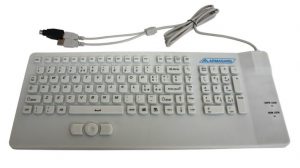Good dentistry is all about keeping abreast of the latest techniques and technologies, and running a smooth dentist surgery these days means ensuring patient records are kept on computer.
Computers are an essential aspect for nearly all medical settings now. Not only do they ensure accurate notes and patient confidentiality, they improve processes and make administration in medical settings so much easier.
There are downsides to using computers in medical surroundings, especially in handling keyboards and computer mice which can spread infections.
Hospital acquired infections are not just a problem for hospitals. Ensuring proper infection control is an essential aspect of all medical settings including dentistry. The problem with computer keyboards (and mice) is that many people handle the same devices, which are difficult to clean and provide lots of hiding places for germs and pathogens.
For this reason, more and more dental surgeries are ensuring they install washable medical keyboards and mice. These are essential for infection control as they can prevent the spread of germs.
Medical keyboards are deigned to not allow bacteria to build up, ensuring no gaps in the keyboard can allow them to harbour. Often made from bacteria resistant material, the key benefit for infection control, however, is the ability to wash them.
Washable and medical keyboards are designed to be regularly cleaned. This is something that can’t be done with conventional keyboards and computer mice, which would soon become disabled with regular exposure to water.
Medical keyboards can be washed with water, soap and even hospital disinfectants, as can a medical mouse, which means you can assure the computer equipment is kept as clean and sterile as the medical equipment.
Because of the frequent use and multiple people that may use a single workstation, by utilising medical and washable peripherals, rates of hospital acquired infections have been reduced in many medical settings. These types of medical computer equipment are now becoming standard in many medicinal locations—including dentistry.

Comments are closed.